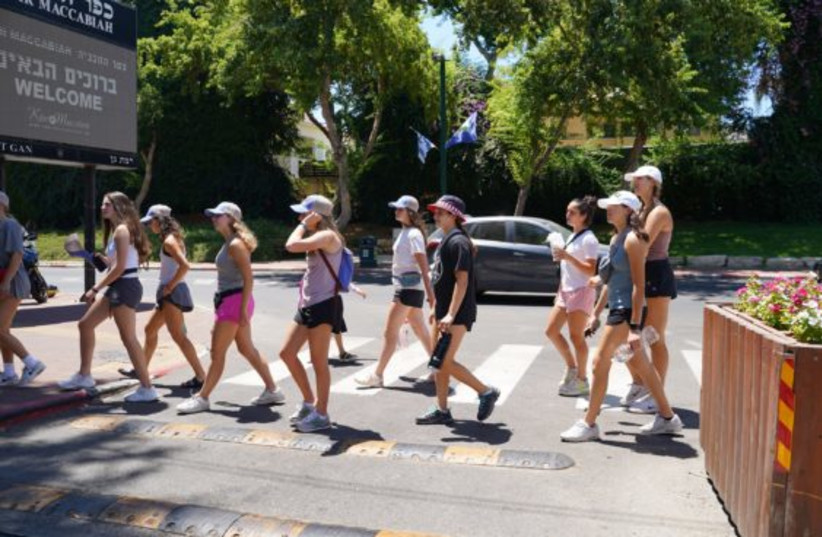The 21st Maccabiah Games are about to get underway. Among the many arriving are over 1,000 Australian athletes, family and officials. It’s Australia’s largest team ever and a testament to the strength and depth of the Australia-Israel relationship.
That so many are traveling also reflects our irrepressible enthusiasm after years of COVID-19-induced restrictions. Aussies are keen to travel, and Israel is a desired destination. Over the past few months, things have finally started looking up on the COVID front. Arriving as an ambassador in a new country in the middle of a pandemic was a challenging and unique experience.
Despite our restrictions, the embassy must continue to provide consular and passport services to help Aussies abroad affected by COVID-19. But health is a priority and I was limited in being able to meet people safely in person and establish relationships – the bread and butter of a diplomat.
All this time trapped in the office or on Zoom calls, I knew there was a beautiful and historic holy land waiting to be explored. So the easing of restrictions and the spirit of the upcoming Maccabiah games inspired me to hop on my bike and spend a few weekends exploring the country and spreading the news that the Aussies were coming to Israel!
Leaving Tel Aviv and Jaffa, the heart of the Aussie-Israeli relationship led me first to Beersheba where Australian soldiers of the Light Horse Regiments led a historic charge against the Ottomans in 1917. I moved to Sde Boker, the retirement home of Israel’s first prime minister, David Ben-Gurion.

I thought about Australia’s strong support for Israel at that time, through the work of statesman H.V. Evatt, a former minister of external affairs and president of the UN General Assembly. Australia had the great honor of being the first country to vote in favor of Resolution 181, welcoming Israel into the international community. These deep-rooted ties and traditions of international support continue to this day.
In the Negev, I couldn’t help but reflect on the remarkable geographic parallels between our two countries. The size is clearly different – Australia is about 350 times bigger than Israel – but I was struck by the Negev’s similarity to the expansive, beautiful, but sparsely populated deserts of Australia.
Much later in my trip – after experiencing the unique majesty of places such as the Dead Sea, Beit She’an, the Sea of Galilee, Safed, Haifa and Acre – I again felt the sense of familiarity on the coastline, watching surfers bobbing in the waves. It was easy to forget this was the Middle East and not Australia’s Pacific coast.
Israel-Australia share more than meets the eye
THOUGH HALF a globe apart, the many geographic similarities, and the challenges both countries face as a result, are striking. My curiosity piqued while riding alongside Caesarea’s ancient aqueducts, a scientific marvel of its time designed to tackle water shortage and agricultural challenges.
With climate change increasingly affecting our environment, what modern scientific marvels might the start-up nation have up its sleeve in the worlds of water tech, green tech and agtech to tackle these wicked problems?
No doubt we can partner these innovations with capable and advanced scientific and business partners in Australia as we respond to these shared challenges. Perhaps those links will continue to build on the 32 percent increase in Australian investment in Israel and the 61 percent increase in Israeli investment in Australia since 2020. This growing investment relationship demonstrates more than simply the transfer of money or goods; it signals optimism about each other’s future and a real commitment to realizing our shared potential.
Discovering more of Israel was an incredible experience. But the best part of this journey was encountering the full spectrum of Israeli people. Menachem from Safed, Miri from Beit She’an, Marwah from Acre, and Yair from Tel Aviv, among many, many others. Yair, by the way, was Yair Lapid, who I met at the Foreign Ministry on the final stage of the trek, before he became prime minister.
All of the people were incredibly welcoming and gave me a glimpse of the story of Israel, in all of its beauty and complexity.
Everyone, without exception, was warm and inviting, and made me feel at home. The cultures and ethnicities may be different, but Israel’s vibrant multicultural society is all too familiar to someone from Australia, which boasts the world’s oldest continuous culture, is home to more than 210 different ancestries, and where nearly half of the current population was born overseas or has a parent who was.
Yarkon Bridge collapse
WHEN WE think about the Maccabiah, it is impossible not to reflect on the Yarkon Bridge collapse at the 1997 games, resulting in the tragic death of four Australian athletes – Gregory Smalls, Yetty Bennett, Elizabeth Sawicki and Warren Zines. May their memory be a blessing.
Even this horrific event shines a light on the enduring strength of the Israel-Australia relationship and our shared values. Following the bridge collapse and reports of the pollution in the Yarkon River, Australia’s Jewish National Fund, in cooperation with Israel’s Environmental Protection Ministry and the Tel Aviv Municipality, raised millions of dollars for the river’s rehabilitation.
In addition, it inspired Phillip Foxman of the Australian Jewish community to launch “Clean Up Israel,” an environmental organization that organizes clean-up initiatives all over Israel. Today, the Yarkon is significantly cleaner and our countries continue cooperating to protect the environment.
Now that we’re finally getting back to normal, I’m looking forward to getting to know a whole lot more of you, at our embassy events, out on the street (on the bike lanes, of course), and at the upcoming Maccabiah Games. So come on out and support the Aussies while they’re in town, and celebrate the incredible athletes from Down Under.
The writer is the Australian ambassador to Israel. The full video of his bike ride through Israel can be viewed on the Australian Embassy in Israel’s Facebook page: https://fb.watch/eajTzwceSs/.
